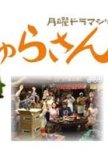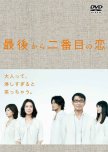
Nevertheless, the story is pretty easy to grasp (also because, being 46 myself, those situations felt awkwardly familiar, LOL!), the acting is great, the music fabulous. Although I'll take a seaside or rural setting over an urban one every day of the week, still I have to say I appreciated how they went and showed some more relaxing, lesser known and imho much nicer Tokyo neighborhoods than the overly used and, at least to me, overly obnoxious Akihabara, Shinjuku etc.
Can't wait to watch the following series! ^__^
Esta resenha foi útil para você?

Esta resenha foi útil para você?

Esta resenha foi útil para você?

The only thing that could've saved this from getting the minimum grade would have been if one of the following two changes to the script had been applied:
1) All of a sudden, Jim Caviezel's character from "Person Of Interest" is magically transported inside the shared-house during the last breakfast scene, and of course he does what he's best at, shooting the male lead's kneecaps off right on the spot! (see if that brings up a reaction on that insufferable fish-face of his!)
2) Right after the last scene, an extra scene with the caption "some time later": we see a prison guard escorting the new inmate, Hongyo, to his cell. The prison guard opens the cell and introduces Hongyo's cell mate, a 7-feet, 250-pounds giant with a scary face and an evil smirk right in the middle of it: "This is Bubba, you guys are bound to get along just fine...you see, he also tends to "GET STRAIGHT TO THE POINT!". Caption: "And they lived *painfully* ever after"...
Esta resenha foi útil para você?

Esta resenha foi útil para você?

Esta resenha foi útil para você?

Esta resenha foi útil para você?

Esta resenha foi útil para você?

Esta resenha foi útil para você?

Esta resenha foi útil para você?

Esta resenha foi útil para você?

Esta resenha foi útil para você?

Esta resenha foi útil para você?

Esta resenha foi útil para você?

Esta resenha pode conter spoilers
With a different ending/message, it would have ended up in my top10 of all times...
I had great expectations regarding this "Umi no Hajimari", and the first half (or even 2/3) of it kept those expectations at himalayan heights...but unfortunately the last third of it, the ending and more generally the message it conveyed proved to be such a huge let-down, as far as I'm concerned.First things first, what I liked:
1) Izutani Rana
As I always put it in such cases, to think that someone can be so good at acting at a such young age is actually kinda scary! This little child could teach many grown up actresses a lesson or two, really. Chapeau, Rana-chan!
2) the OST
Catchy and haunting, it'll stay with you even long after having finished watching the series. It reminded me a lot of "1 lt. no Namida", which is a huge compliment, in my book.
3) the "packaging"
Direction, editing, photography...all top-notch, period.
And now on to what I didn't like (impossible to explain it without SPOILERS so consider yourselves warned and stop reading NOW if you wanna avoid them!):
as briefly mentioned in the opening paragraph, the series went downhill right after episode 8, and the downward spiral just kept going until the end.
In my very humble opinion (and I totally agree with thecheesz_'s review so at least I know I'm not the only one thinking this!), the problem lies with selfishness and making wrong choices that lead to others' suffering being portrayed as a good thing. It's so not-Japanese it hurts!!! >_______<
In a Confucian society, the ethical imperative is that self-sacrifice is *necessary* for harmony. In a nutshell, your freedom ends where the others' begins, and that's something you should always keep in mind. Disregarding this simple truth should be frowned upon, not celebrated. Instead, we have Natsu-kun, Tsuno-san, the grandparents and most of all the poor Umi-chan horribly suffering from the very poor choices of two immature and selfish individuals (Mizuki and Yayoi) who are, on top of that, portrayed as role models for having made others suffer.
And finally their "example" leads Natsu-kun to make another poor choice that in its turn makes Umi-chan suffer even more (when he listens to Yayoi instead of taking Umi's grandpa's advice and makes Umi change school and home). Which is the obvious outcome of making choices based solely on your own volition, not taking others into account. Quod Erat Demonstrandum.
This is how I would have written the last third of the series:
a) First of all, I would've had Yayoi-san make no U-turn whatsover and stay instead where she was at - that is, being a caring, selfless person who would've been just all too eager to become Umi-chan's new mom. So no break-up.
b) Secondly, I would have made Mizuki-san explain her choices as follows: going to the pre-abortion ob-gyn, she was informed of her cancer and given two options: either remove it and forever lose the ability to procreate, or else procede with the pregnancy and risk that the cancer become inoperable. She chose to give birth to Umi, and to push Natsu away (and later on, to not let Tsuno get too close) because she didn't want to burden them (which I'm not saying it's actually right either - but at least it would've been a lot more consistent with Japanese culture!!!)
c) Thirdly, I would've had Natsu take the grampa's advice and move in with them, even if it had meant to change jobs (for crying out loud, he's a freaking *salesman*, not Dr. Schweitzer nor Mother Teresa, he could've changed jobs and the world wouldn't have been any worse for it! >____<)
d) Lastly, I would've had Natsu, Yayoi and Umi build a happy family together in the end - oh, and while at it, I would've made sure that Tsuno too found a better half (like, one of Yayoi's colleagues perhaps).
And all would've lived happily ever after...
Esta resenha foi útil para você?
























